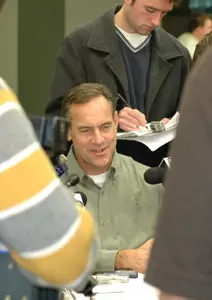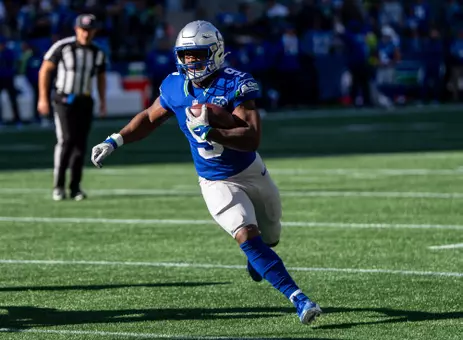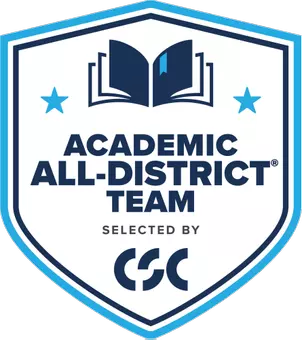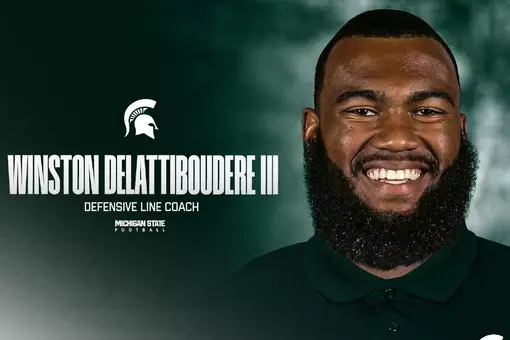
Grid Insider: Meet Mark Dantonio
12/10/2006 12:00:00 AM | Football
Dec. 10, 2006
On assembling his coaching staff . . .
When I first found out about the possibility of coming to Michigan State, the first thing I did was check with my staff in terms of where they would be with everything. I think that's important because I want continuity in our football program. One of the biggest factors for me as the coach at Cincinnati was to retain our coaches because I thought with continuity you would be able to keep the system in place and keep the teaching progression the same. So that was important to me if we were going to consider Michigan State - to be able to continue with that continuity on our staff. When I was offered this job, the first thing I did was ask my staff who wanted to come, and if they wanted to come, we'd move forward. They did and that's where we're at.
On building a coaching staff . . .
The first thing I make sure I do when I'm hiring a staff is I'm going to hire good people. I'm going to hire coaches who care about young people and care about the community of Michigan because they need to be of service to that community, not just win football games. That's very important to me, and if you hire the right people and things don't go well, you readjust and keep moving on. That's always going to be the main focus on who we're going to hire.
On beginning to recruit for MSU . . .
The first thing I did after the press conference was fly back to Cincinnati to take care of business. I had a recruiting meeting right there on the air field and sent seven coaches up here, and those seven coaches were processed and got on the road the very next day. We've been out since day one, so we only lost one day of recruiting. We have to make up ground because I think it's all about relationships and trust. We have four coaches going to various areas in Michigan, and we've been in Ohio, New Jersey, Atlanta, and Tallahassee, so we've been around.
On his recruiting philosophy . . .
I try not to be a pressure guy. These are tough decisions that young people have to make. I think it has to be the family's and the player's decision. We have a great thing to sell at Michigan State University - tremendous facilities, great tradition, fan support and a great state, so we're going to get our fair share. And I always want to make sure, after it's all said and done, they look at Mark Dantonio and our staff at Michigan State and say they tried to do it the right way. We're going to lose some, we're going to have growing pains, but it comes down to relationships and trust. I think that at a place like Michigan State, you have stability as a university because you have a name and you have something you can sell, and that's important.
On pitching his coaching philosophies to recruits . . .
I think the main thing is our offensive philosophy has to be built around the players we have, whether they're coming in or going out. From a coach's perspective, I want to be able to walk up to a tailback and tell him he could be a 1,000-yard rusher at Michigan State University because we're going to run the football. I want to be able to say that. I also want to be able to say to a wide receiver or quarterback that we're going to throw for 300 yards a game, and we're going to throw the ball equally as much. The key to me is being multi-dimensional and have the ability to attract a great wide receiver because you're going to throw the ball down the field and isolate him one-on-one because you can run the football. We want offensive linemen, who want to be able to pass protect and run block, and a quarterback, who needs to understand that he can't throw the ball 60 times a game and be effective. We want to attract the guys that are the very best football players and I want everybody to know that if you come here, we can feature you if you're a good enough player. But at the same time, I don't want to have an offense that's just going to run the zone play; I want to run power football and be able to get that tough yard and get that back that wants to run the ball 40 times a game and get that quarterback when we may need to throw the ball 40 times. I think the key to being successful offensively is being two-dimensional.
On how the current team fits with his coaching philosophy . . .
I think all football players can adjust. We're not talking about changing the game; it still comes down to blocking and tackling. As I remember at one point, Michigan State was No. 4 in the country running the football after four games. They've had the ability to run the ball here before, and we've got good running backs. I know (Javon) Ringer is an outstanding player - I thought he was the best player out of Ohio a couple years ago. We've got some wide receivers that can play, and (Brian) Hoyer has done a nice job from what I understand, so I think we have a little of everything here and it's exciting.
On the team he's inheriting . . .
From my perspective right now, our football team is lining back up. They've been without a head coach for a little bit, and it's time to line back up and find out who we are. It's a clean slate and we're starting over, so everybody will have an equal opportunity and that's a good thing sometimes. It's going to be about our football team, it's not going to be about me. It's going to be about our football team and what we're able to do collectively.
On offensive coordinator Don Treadwell . . .
Treadwell was the offensive coordinator when they won a national championship at Youngstown State; he was with me for five years there. From there, he worked with (Tyrone) Willingham at Stanford; he was a co-offensive coordinator at Boston College when he went with Tom O'Brian; and he's been at N.C. State, so he's had a variety of roles. The thing that Don Treadwell brings to the table is tremendous patience and stability. He does a great job of listening and interacting with all of our other coaches and he's always on time with the play; you never see us get a delay of game penalty. We're going to feature what our guys do well.
On the mentality he's bringing to Michigan State . . .
When Treadwell came to Cincinnati, I told him that I wanted to run the football and have a football team that's built on toughness. That's what I want and that's what we're going to do. I said it in the press conference, and I think when you make a statement like that, you carry yourself upright if you're doing things with toughness. We're going to do that here. This program was built on toughness with Duffy Daugherty and George Perles. I know that for a fact and it was that way with Nick Saban, and that's the way we're going to do it.




